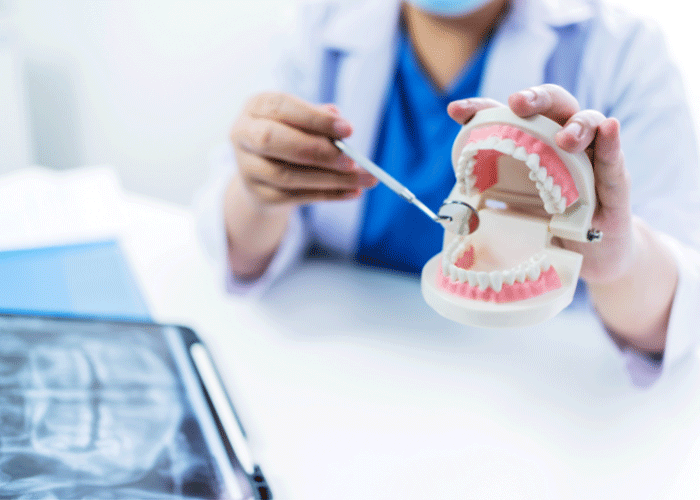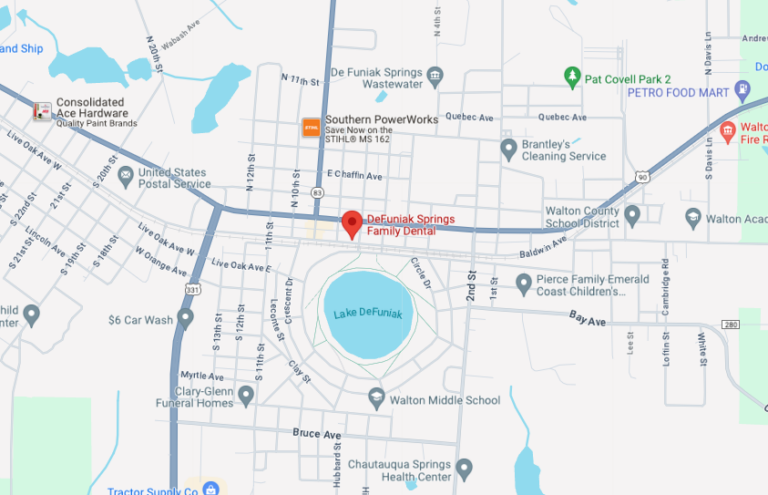Oral Surgery
Oral and maxillofacial surgery is commonly referred to as oral surgery and sometimes dentoalveolar surgery. Oral surgeries include any surgical procedures associated with the teeth, soft tissues, or jaws—from wisdom teeth removal to cleft palate repair. Get Comprehensive Oral Surgery Solutions to Enhance Your Smile and Health at DeFuniak Springs Family Dental.
Oral and Facial Surgery in DeFuniak Springs, FL
At DeFuniak Springs Family Dental, we specialize in a wide range of oral surgery procedures designed to improve your oral health and overall well-being. Whether you need a wisdom tooth extraction, dental implants, or more complex jaw-related treatments, our experienced oral surgeons are equipped with the latest techniques and technologies to ensure safe, effective outcomes.
We understand the importance of comprehensive care and are committed to providing you with a comfortable, supportive environment from consultation through recovery.

-
How long does an oral surgery take?
The duration of an oral surgery can vary widely depending on the type and complexity of the procedure. Simple extractions may take as little as 20 to 40 minutes, while more complex surgeries like dental implant placement or corrective jaw surgery might last several hours. During your consultation at DeFuniak Springs Family Dental, your surgeon will provide you with an estimated timeframe for your specific procedure.
-
How long does it take to recover from an oral surgery?
Recovery times post-oral surgery can differ based on the individual’s health, the extent of the surgery, and the body’s healing response. Generally, for minor procedures like tooth extractions, patients might expect a recovery period of a few days to a week. More complex surgeries may require several weeks to a few months for complete healing. Your oral surgeon will give you a detailed recovery timeline and what to expect during your healing process.
-
What are tips to help with recovery after an oral surgery?
To ensure a smooth and speedy recovery after oral surgery, consider the following tips:
- Follow Post-Operative Instructions: Adhere strictly to the care guidelines provided by your surgeon, including medication management and activity restrictions.
- Rest: Allow yourself plenty of time to rest, especially in the first 24-48 hours after surgery. Keeping your head elevated can help reduce swelling.
- Apply Ice Packs: Use ice packs on the outside of your face to reduce swelling and bruising. Apply for 15 minutes on and 15 minutes off during the first day after surgery.
- Eat Soft Foods: Stick to a diet of soft, easy-to-chew foods to avoid disturbing the surgical site. Gradually reintroduce solid foods as healing progresses.
- Maintain Oral Hygiene: Gently rinse your mouth with warm salt water after meals and before bed to keep the area clean. Avoid using a straw, spitting forcefully, or smoking, as these actions can hinder healing.
- Stay Hydrated: Drink plenty of water to stay hydrated, but avoid hot beverages which can disrupt the healing process.
-
What foods should I eat after oral surgery?
After oral surgery, choosing the right foods is crucial for a comfortable recovery and to aid in the healing process. It’s best to select foods that are soft, easy to chew, and nutritious to avoid irritating the surgical site. Here are some recommended foods to eat after oral surgery:
- Soups and Broths: Lukewarm or slightly warm soups and broths are soothing and provide hydration. Avoid very hot soups to prevent irritation.
- Smoothies: Nutrient-rich smoothies made with your favorite fruits, vegetables, and a protein base like Greek yogurt or protein powder. Avoid using straws as the suction can disrupt the healing process.
- Yogurt: High in protein and probiotics, yogurt is a good option for a soft food that’s also easy on your stomach.
- Mashed Potatoes: Soft, creamy, and comforting, mashed potatoes can be a hearty option that’s also easy to consume.
- Scrambled Eggs: Packed with protein, scrambled eggs are gentle on your mouth and can be very satisfying.
- Applesauce: A good source of vitamin C and fiber, applesauce is gentle and doesn’t require chewing.
- Cottage Cheese: Soft, creamy, and high in protein, cottage cheese is another excellent choice.
- Pudding and Custard: These can be a sweet treat that’s also easy to eat.
- Soft Fruits: Bananas, peaches, and other soft fruits can be eaten as is or mashed up for easier consumption.
- Steamed Vegetables: Soft-cooked vegetables like carrots, squash, or spinach can provide necessary nutrients without requiring much chewing.
- Oatmeal: Lukewarm oatmeal can be both filling and gentle on the surgical site. Avoid adding nuts or seeds.
- Rice and Pasta: Soft-cooked rice and pasta can be good options as long as they’re cooked to be very soft.
Remember, it’s important to avoid any hard, sticky, or chewy foods that could irritate the surgical site, dislodge a blood clot, or get stuck in the area. Additionally, avoid using a straw for drinking, as the suction can interfere with the healing process. Always follow your dental surgeon’s specific dietary recommendations post-surgery for the best recovery outcome.
More Questions?
If you have more questions about oral surgery, please contact our office, and we will be happy to discuss further.

